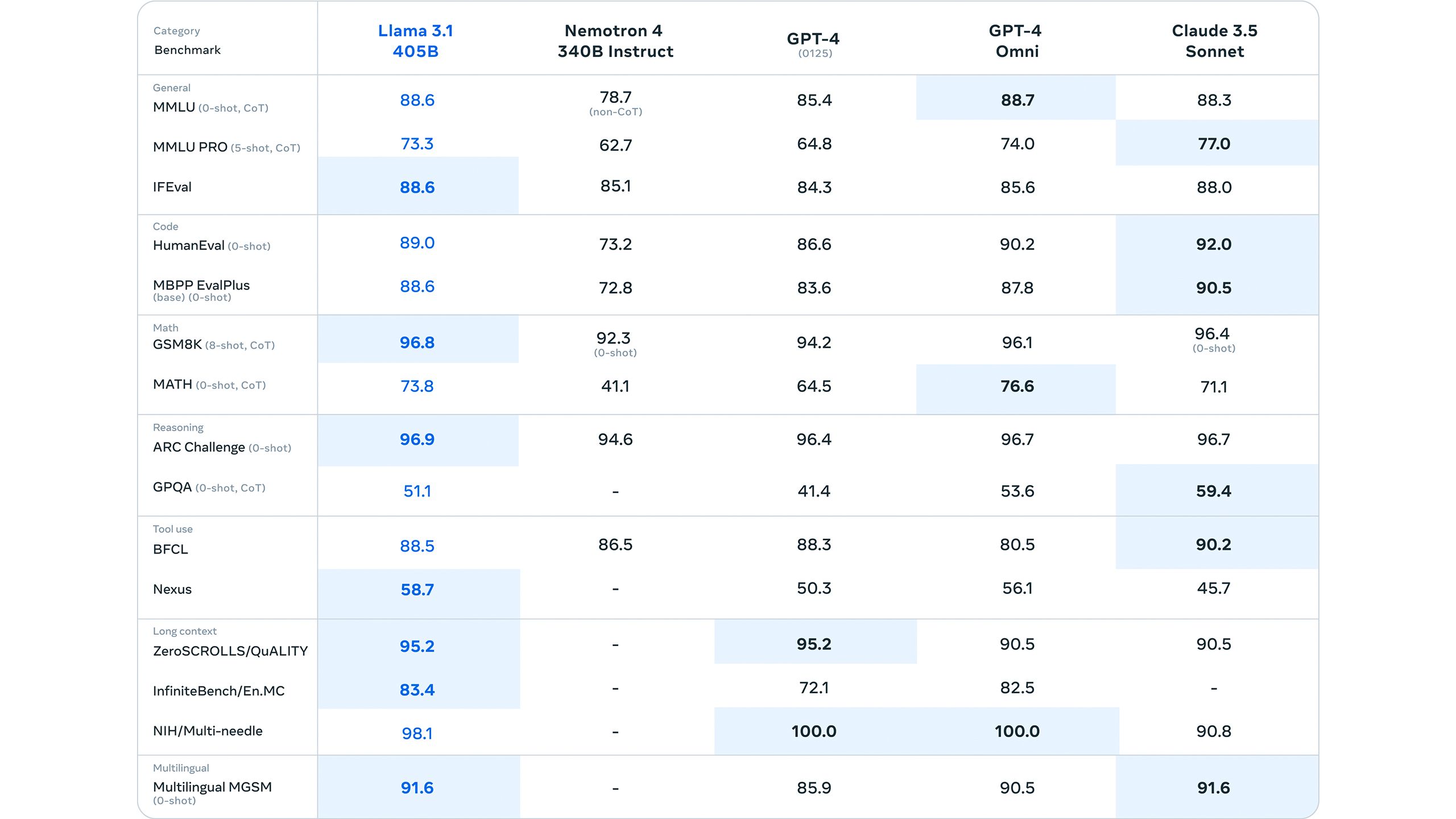Key Takeaways
- Llama 3.1 outperformed rivals in benchmarks.
- Meta offers Llama 3.1 as an open-source model.
- Commercial use of Llama 3.1 is limited by community license terms.
Meta has released a new AI model called Llama 3.1. The company claims that this new open-source model is able to compete with the best proprietary models from other leading AI companies, including OpenAI’s GPT-4o and Anthropic’s Claude 3.5 Sonnet, and can even beat them in some benchmarks.
The model’s full name is the snappy Llama 3.1 405B, a name that makes the name GPT-4o mini seem positively inspired. However, it does have that name for a reason; the model is a 405-billion parameter model, which is a significant leap from the Llama 3 8B and 70B models. The new model is free to use in Meta AI and WhatsApp in the US and is available for anyone to download.
Meta believes that this model can be a turning point in the development of AI, comparing it to the way that open-source Linux became an industry standard despite companies developing their own closed-source Unix systems. However, Llama 3.1 is not quite as open-source as it seems.
Related
Meta confirms its AI will land on Quest VR headsets in the U.S. in August
Meta AI is making the jump to the company’s Quest headsets in the U.S. and Canada, and will arrive in ‘experimental mode.’
How does Llama 3.1 compare with other AI models?
Meta’s new model outperformed rivals in some benchmarks
Meta
As is the norm these days when any new AI model is launched, Meta released some benchmark scores comparing its performance to other models. The tables show that Llama 3.1 405B comes out on top in 8 of the 15 benchmarks. These tests should always be taken with a pinch of salt, but the figures do indicate that Llama 3.1 is performing at the level of the best models currently available.
Meta
Interestingly, Google’s Gemini is missing from these tables. Meta has claimed that it found it challenging to reproduce previously published results when using Google’s APIs, which sounds likely something of a cop out. However, in a post on Threads, Meta claims that Llama 3.1 405B “competes with leading closed source models like GPT-4, Claude 2, and Gemini Ultra across a range of tasks.” None of these results are published in the post, however.
Is Llama 3.1 really open source?
To some extent, but it’s no Linux
Meta is clearly going against the grain by offering Llama 3.1 as an open-source model. Other major players such as OpenAI and Google are making money from subscriptions to their apps or by charging for usage via API. Meta is essentially giving away its model for free, so what gives?
A big reason that Meta is able to do this is that it has a very different business model to companies such as OpenAI. OpenAI is solely an AI company, and the only way it can make money is by selling access to its models. Meta, on the other hand, makes money almost entirely from advertising revenue. Developing AI models is a costly business, so Meta must believe it can make money from it in the long term.
In order to use Llama 3.1 in its products, Apple would have to request a license from Meta, and this request can be refused at Meta’s discretion.
Which brings us to just how open-source Llama 3.1 really is. Llama 3.1 is open-source to an extent, but has a community license agreement that includes some interesting conditions. One of the most interesting is that Llama 3.1 is free for commercial use unless the monthly active users of the products or services made available by the licensee is greater than 700 million, which seems an oddly specific number.
This means, for example, that Apple can’t take Llama 3.1 and throw it into iOS 18 to use within Siri for free. In order to use Llama 3.1 in its products, Apple would have to request a license from Meta, and this request can be refused at Meta’s discretion. It appears that Meta may not be being as altruistic as it first appears; the intent is most likely to aim to become the industry standard for AI, and then charge big companies significant sums for a license.
Trending Products

















